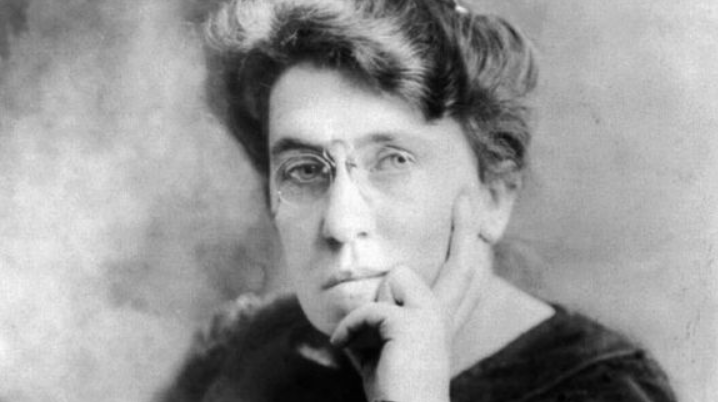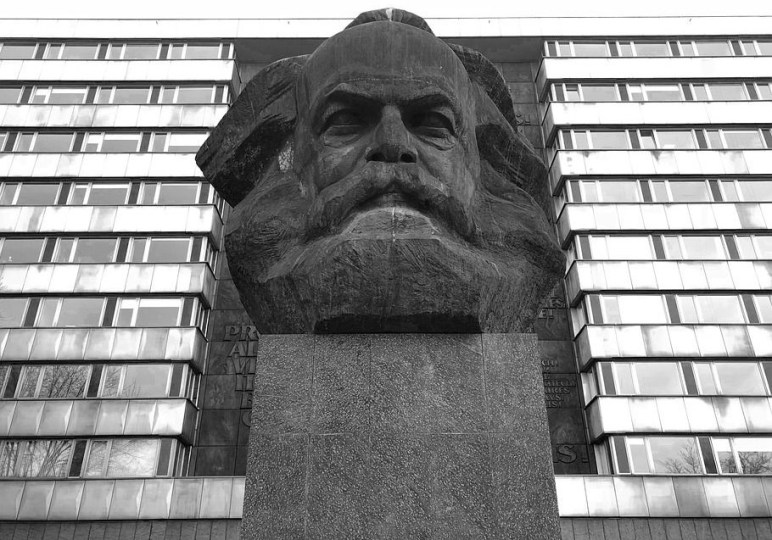by Paul Cudenec
One of the big questions facing all of us trapped inside today’s increasingly totalitarian global system is ‘How did we get here?’
How was it ever possible that human beings, once as free as every other wild creature on the planet, were able to be captured by a small minority of their own kind and reduced to a degraded and disempowered condition of complete dependency on their jailors?
There are some interesting clues in A.L. Morton’s A People’s History of England, first published in 1938.
He looks back to the origins of tribal society in the Stone Age, in which an egalitarian ethos prevailed: “The food that was gathered for the social group, the animals that were hunted, the fish that was caught, were jointly produced and jointly consumed”. [1]
He describes small kinship groups, probably “uniting the descendants of common great-grandparents”, which exchanged goods, primarily food, with other groups and also sought mates outside their own tribe.
“The kin was, in fact, a group of tremendous social cohesion. A man without kin was like a fish without water, helpless, doomed”. [2]
Morton writes about the migrations of the Celts across Europe and to Britain, more than 2,000 years ago, in the shape of “large tribes, composed of free warriors under tribal chiefs, accompanied by considerable numbers of women and children”. [3]

He notes: “While Celtic tribal society cannot be described as classless, its class divisions were not sharply marked or of decisive importance. The difference between chief and free tribesman was one of degree, rather than of kind”. [4]
But, over time, there was “a gradual weakening and break up of tribal society and its eventual replacement by feudalism”, [5] beginning a process which was ultimately to see the English people “driven from the land” by the arrival of industrialism. [6]
Morton identifies a key stage in this long-term loss of freedom as coming after 600AD, when central power began to reemerge after a hiatus following the Romans’ departure.
Social divisions were already increasing, private property in land was beginning to take shape and the state, growing out of the military conquest and division of the country by the Anglo-Saxons, was “superseding the looser tribal organisation that served the English in their German homeland”. [7]
The historian then declares: “Such a process, marked by the acquisition of special powers by a minority and at the expense of the remainder of the people, is in fact the only way in which society can advance beyond the tribal stage and must, for all its harshness, be regarded as essentially progressive”. [8]
I found this passage absolutely shocking!
It is, in fact, a text-book real-life instance of the mental process that George Orwell terms doublethink in his novel Nineteen Eighty-Four, this being “the power of holding two contradictory beliefs in one’s mind simultaneously, and accepting both of them”. [9]

Morton is plainly aware that the process he is describing was a bad thing, referring to the “harshness” of the “acquisition of special powers by a minority and at the expense of the remainder of the people”, but he cannot bring himself to end the sentence without expressing the view that at one and the same time it was a good and necessary thing!
We also see unfolding, in real time, as it were, in the writing of this sentence, the technique by which doublethink is achieved, which Orwell calls crimestop, the ability not to allow oneself to think in ways unapproved by the Party.
What inner voice is Morton oebying when he declares that the domination of the majority by a little powerful clique “must” be seen as “progressive”?
It is worth recalling that Orwell called the ruling ideology of the Big Brother regime Ingsoc, short for English Socialism, even though he was himself a sort of English socialist, albeit of a libertarian and culturally-traditionalist variety.
He did so because he could see the authoritarianism, dogmatism and intellectual dishonesty that characterised the communist left.
He had been appalled by this after fighting with the socialist POUM and the anarchists in the Spanish revolution, only to find his freedom-loving comrades, who had refused to obey orders from Stalin, being smeared by communists as “fascists” who were secretly working for Franco.
I can’t help being reminded of the way that those of us who spoke up for freedom during the Covid clamp-down were (and still are) subjected to similar lies and insults from contemporary equivalents on the left.

Morton, our doublethink historian, was a Marxist, and a conscientious one at that, judging by the way that he feels the need to apologise for the inclusion in his bibliography of many books “written by non-Marxist historians, with a standpoint which I believe to be quite mistaken”. [10]
Furthermore, A People’s History of England was “adopted quasi-officially as the Communist Party’s national history”. [11]
Morton had a keen interest in William Blake and William Morris, two organic radical inspirations whose overlapping vision was a long way from Marxist orthodoxy and who were deeply opposed to state control and industrialism.
But he had to write, evidently against his better instincts, that the emergence of a central state (and capitalism) was a “progressive” thing because that is how Marxist dogma says socialism will ultimately be achieved.
The inner voice stopping short his historical crimethink was the internalised one of the Party, which in his case was the Communist Party of Great Britain (CPGB).
It is certain that many people have learned much from the economic and social analysis of Karl Marx and his multitude of disciples, such as Morton.
But the trouble is that the ideology is a total dead end!
It describes and criticises the current system, but does not provide us with a way out of it.
As Morton’s remarks illustrate, the existence of the state and of industrial “progress” are essential to its idea of how communism will arrive, even if an eventual “withering away” of the state is theoretically imagined.
The state is the structure used by a power-hungry minority to impose its control and domination of the majority – its laws, its tax-gathering, its policing, its surveillance, its brainwashing education.
When this power-hungry minority indulges in usury to sustain and amplify its power, this manifests in physical terms as “development” or industrial “progress”.
Marxist ideology fails to challenge either of these phenomena, instead claiming, as Morton spells out, that they are necessary stages on the glorious road to communism.
Furthermore, you “must” not suggest otherwise, on pain of being denounced by the communist thinkpol as reactionary, utopian, counter-revolutionary or fascist.
When you add into the mix the general Marxist hostility to any kind of spirituality, you are looking at an “oppositional” ideology that totally fails to oppose the essence of the system it pretends to combat.
All it proposes is a different method of managing the same dehumanising machineries of state and development.
Anarchists have been on to this for a long time, of course.
Mikhail Bakunin (1814-1876) accused the Marxists of ignoring a number of “natural traits” such as “the intensity of the instinct of revolt, and by the same token, of liberty”. [12]
Gustav Landauer (1870-1919) described Marxist dogma as “the plague of our times”, [13] bemoaning “the grotesque wrongness of their materialist conception of history” [14] in which they reduced everything to “what they call economic and social reality”. [15]
Emma Goldman (1869-1940) called Marxism “colourless and mechanistic” [16] and said she had witnessed in Bolshevik Russia “the best human values betrayed, the very spirit of revolution daily crucified”. [17]

And, a bit more recently, Fredy Perlman (1934-1985) argued that Marxism was “a pseudo-resistance which was in fact an instrument for the final reduction of human activity to a mere variable of Capital”. [18]
Over recent decades, anarchist movements and thinking have been increasingly corrupted by Marxist influences and polluted by so-called “libertarian communism”.
Although it is not the same thing as contemporary woke ideology, I do think that this communist tendency undermined, confused and weakened anarchist understanding to the point that it became vulnerable to take-over by toxic corporate-complicit dogma.
Anarchism was basically dragged down to a lower level by Marxism, which has fundamentally failed to provide us with a vision of human history that sees beyond the limits established by the system.
Indeed, you could say that Marxism is one of those limits, a gatekeeping ideology which, by insisting that the theft of our natural freedom is a necessary and “progressive” advance, turns us completely away from any attempt to seize it back.

[1] A.L. Morton, A People’s History of England (London: Lawrence & Wishart, 1999), p. 6.
[2] Morton, p. 6.
[3] Morton, p. 5.
[4] Morton, p. 8.
[5] Morton, p. 5.
[6] Morton, p. 14.
[7] Morton, p. 25.
[8] Morton, p. 25.
[9] George Orwell, Nineteen Eighty-Four (Harmondsworth: Penguin, 1958), p. 171.
[10] Morton, p. 464.
[11] https://grahamstevenson.me.uk/2008/09/19/a-l-morton/
[12] Mikhail Bakunin, Marxism, Freedom and the State, trans. by K.J. Kenafick, (London: Freedom Press, 1990), p. 50.
[13] Gustav Landauer, For Socialism, trans. by David J Parent, (St Louis: Telos Press, 1978), p. 32.
[14] Landauer, p. 123.
[15] Landauer, p. 56.
[16] Emma Goldman, Living My Life, Vol I, (London: Duckworth, 1932), p. 9.
[17] Goldman, Living My Life, Vol II, p. 757.
[18] Fredy Perlman, ‘Progress and Nuclear Power’, Anything Can Happen (London: Phoenix Press, 1992), p. 76.


The state is the structure used by a power-hungry minority to impose its control and domination of the majority – its laws, its tax-gathering, its policing, its surveillance, its brainwashing education.
*
It comes as a surprise that political left-leaning men and women worldwide have yet to embrace and demand universal conversion to the economic model devised by economist Henry George (1839-1897), known as Land Value Taxation or “the single tax”… Henry George was considered an “International Rock Star” during his lifetime, while George’s wildly popular “Single Tax” found support from the likes of famed Russian novelist Leo Tolstoy. It might be stated the Henry George economic model is the best economic model of which most people are totally unaware, giving one reason to pause and seriously consider why the model has become the intellectual victim of near-total suppression.
(Wikipedia – Legacy)
Henry George’s ideas on politics and economics had enormous influence in his time. His ideas gave rise to the economic philosophy now known as Georgism. However, his influence slowly waned through the 20th century. Nonetheless, it would be difficult to overstate George’s impact on turn-of-the-century reform movements and intellectual culture. George’s self-published Progress and Poverty was the first popular economics text and one of the most widely printed books ever written. The book’s explosive worldwide popularity is often marked as the beginning of the Progressive Era and various political parties, clubs, and charitable organizations around the world were founded on George’s ideas. George’s message attracts support widely across the political spectrum, including labor union activists, socialists, anarchists, libertarians, reformers, conservatives, and wealthy investors. As a result, Henry George is still claimed as a primary intellectual influence by both classical liberals and socialists. Edwin Markham expressed a common sentiment when he said, “Henry George has always been to me one of the supreme heroes of humanity.”
For more study of Henry George, see: https://www.henrygeorgefoundation.org/about-the-foundation/the-life-of-henry-george.html
LikeLiked by 1 person
The spread of Communism from Russia was foretold by Our Lady of Fatima 4 months before the Bolshevik Revolution in 1917, as a punishment from God for the many & grievous sins of mankind. See
Also, there was no “Stone Age.” See “Cataclysm From Space, 2800 BC – The Cause of the Biblical Flood”: https://www.youtube.com/watch?v=oor7Cl0rN7I&t=3s
LikeLike